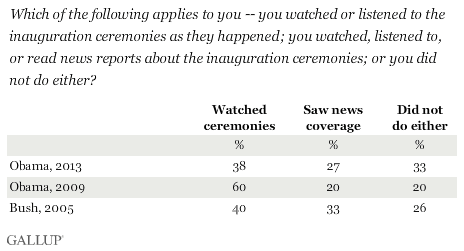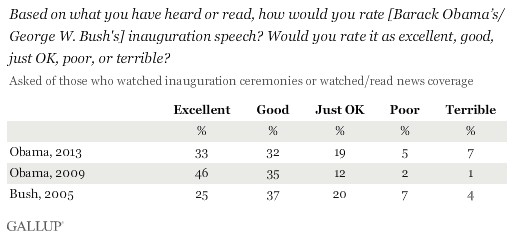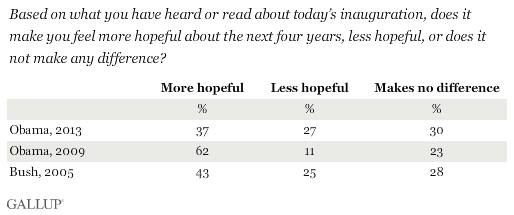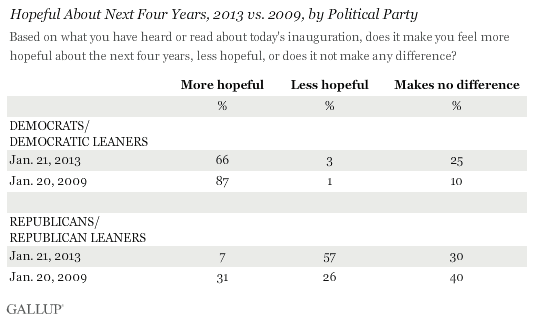PRINCETON, NJ -- Thirty-eight percent of Americans interviewed Monday night said they watched or listened to the inauguration ceremonies as they happened; another 27% saw, read, or heard news coverage of the events. That is down considerably from 2009, when a combined 80% watched the ceremonies live (60%) or saw news coverage of them (20%). Reported viewership of Monday's ceremonies is similar to what Gallup measured for George W. Bush's second inauguration eight years ago.

These results are based on a one-night reaction poll conducted Monday evening after most of the public inauguration ceremonies took place. Gallup conducted similar one-night polls after the 2005 and 2009 inaugurations.
Democrats and Democratic-leaning independents (56%) were more than twice as likely as Republicans and Republican-leaning independents (26%) to report watching Monday's inauguration ceremonies as they happened. Viewership among both party groups was down from 2009, when 70% of Democrats and 51% of Republicans reported watching the events as they occurred.
Obama Address Rated Positively
Sixty-five percent of Americans who watched this year's ceremonies or saw news coverage of them rated Barack Obama's inaugural address as excellent (33%) or good (32%). Americans were also generally positive about Obama's first and Bush's second inaugural addresses, rating Obama's 2009 speech the best of the three.

More than nine in 10 Democrats who watched the ceremonies or saw coverage of them rated Obama's speech as excellent (53%) or good (39%), compared with 25% of Republicans rating the speech positively. The plurality of Republicans, 42%, said the speech was "just OK."
Second Inauguration Engenders Less Hope Than the First
Given the lower levels of attention paid to the second inauguration by Americans, and their less positive reaction to Obama's speech, it is not surprising that fewer Americans said the inauguration made them more hopeful about the next four years than did so in 2009. Specifically, 37% of Americans said they are now more hopeful about the next four years after Monday's presidential inauguration ceremonies, compared with 62% after Obama's first inauguration. Reaction to Monday's inauguration was similar to Bush's second inauguration in 2005.

The poll finds 66% of Democrats saying they are more hopeful about the next four years after Monday's ceremonies. That is down from 87% after Obama's first inauguration. In 2009, Republicans were about as likely to say they were more hopeful about the next four years as to say less hopeful. Now, most Republicans say they are less hopeful.

Implications
President Obama's second inauguration was not as widely viewed as his first and did not generate the same level of enthusiasm, although this week's ceremonies were still rated positively, in a general sense. In many respects, Americans reacted in a similar fashion to Obama's second inauguration as they did to Bush's second inauguration.
It certainly would be understandable for Americans to be less excited about a president's second inauguration than his first, with the novelty of his being president long since passed. That is especially likely to be the case for Obama, whose first inauguration was historic as the first black U.S. president. Further, Obama took office in 2009 at a time when many Americans were yearning for better days as the country remained in an economic recession, and were looking to the young, energetic, and inspiring Obama to provide that hope. Four years later, conditions in the United States have improved in many respects, but there remain many signs -- most notably, a still-high unemployment rate -- of a nation not fully recovered.
Survey Methods
Results for this Gallup poll are based on telephone interviews conducted Jan. 21, 2013, on the Gallup Daily tracking survey, with a random sample of 513 adults, aged 18 and older, living in all 50 U.S. states and the District of Columbia.
For results based on the total sample of national adults, one can say with 95% confidence that the maximum margin of sampling error is ±6 percentage points.
Interviews are conducted with respondents on landline telephones and cellular phones, with interviews conducted in Spanish for respondents who are primarily Spanish-speaking. Each sample of national adults includes a minimum quota of 50% cellphone respondents and 50% landline respondents, with additional minimum quotas by region. Landline telephone numbers are chosen at random among listed telephone numbers. Cellphone numbers are selected using random-digit-dial methods. Landline respondents are chosen at random within each household on the basis of which member had the most recent birthday.
Samples are weighted to correct for unequal selection probability, nonresponse, and double coverage of landline and cell users in the two sampling frames. They are also weighted to match the national demographics of gender, age, race, Hispanic ethnicity, education, region, population density, and phone status (cellphone only/landline only/both, cellphone mostly, and having an unlisted landline number). Demographic weighting targets are based on the March 2012 Current Population Survey figures for the aged 18 and older U.S. population. Phone status targets are based on the July-December 2011 National Health Interview Survey. Population density targets are based on the 2010 census. All reported margins of sampling error include the computed design effects for weighting.
In addition to sampling error, question wording and practical difficulties in conducting surveys can introduce error or bias into the findings of public opinion polls.
Polls conducted entirely in one day, such as this one, are subject to additional error or bias not found in polls conducted over several days.
View methodology, full question results, and trend data.
For more details on Gallup's polling methodology, visit https://www.gallup.com/.
